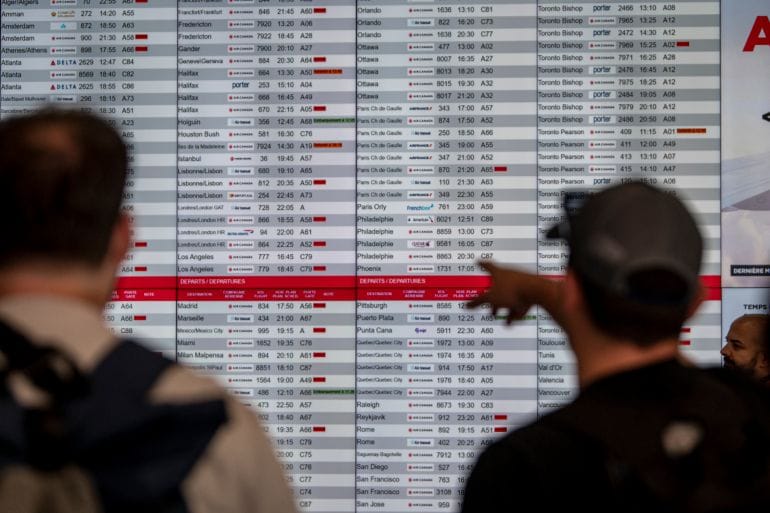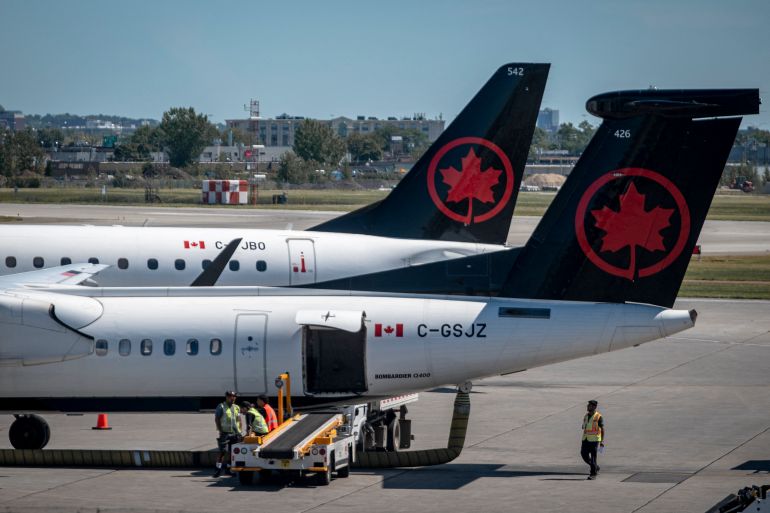Hundreds of flights have been grounded after Air Canada’s unionised flight attendants went on strike after talks over an increase in wages with the country’s largest carrier stalled.
“We are now officially on strike,” the Canadian Union of Public Employees (CUPE), which represents Air Canada’s 10,000 flight attendants, said in a social media post just before 01:00 ET [05:00 GMT].
The airline said on Saturday it had suspended all flights for Air Canada and its budget arm Air Canada Rouge due to the strike, which is the first since 1985.
“About 130,000 customers will be impacted each day that the strike continues,” Air Canada said in a statement.
“Air Canada is strongly advising affected customers not to go to the airport unless they have a confirmed ticket on an airline other than Air Canada or Air Canada Rouge,” the airline added.
Flights for regional operators Air Canada Jazz and PAL Airlines would continue to operate.

Air Canada had announced its latest wage offer to flight attendants in a statement on Thursday, specifying that under the terms, a senior flight attendant would, on average, make CAN$87,000 ($65,000) per year by 2027.
CUPE has, however, described the airline’s offers as “below inflation (and) below market value”.
The union has also rejected requests from the federal government and Air Canada to resolve outstanding issues through independent arbitration.
In addition to wage increases, the union has said it also wants to address uncompensated ground work, including during the boarding process.
Rafael Gomez, who heads the University of Toronto’s Centre for Industrial Relations, told the AFP news agency that it is “common practice, even around the world” to compensate flight attendants based on time spent in the air.
He said the union had built an effective communication campaign around the issue, creating a public perception of unfairness.
An average passenger, not familiar with common industry practice, could think, “‘I’m waiting to board the plane and there’s a flight attendant helping me, but they’re technically not being paid for that work,’” he said, speaking before the strike began.
“That’s a very good issue to highlight,” Gomez further said, adding that gains made by Air Canada employees could affect other carriers.
On Saturday, flight attendants will picket major Canadian airports, where passengers have already been trying to secure new bookings earlier in the week, as the carrier gradually wound down operations.
Passenger Freddy Ramos, 24, told the Reuters news agency on Friday at Canada’s largest airport in Toronto that his earlier flight was cancelled due to the labour dispute and that he had been rebooked by Air Canada to a different destination.
“Probably 10 minutes prior to boarding, our gate got changed, and then it was cancelled and then it was delayed and then it was cancelled again,” he said.

Canadian businesses reeling from a trade dispute with the United States have urged the federal government to impose binding arbitration on both sides, which would end the strike.
In a statement issued before the strike began, the Business Council of Canada warned that an Air Canada work stoppage could add further pain.
“At a time when Canada is dealing with unprecedented pressures on our critical economic supply chains, the disruption of national air passenger travel and cargo transport services would cause immediate and extensive harm to all Canadians,” it said.
Air Canada has asked Prime Minister Mark Carney’s minority Liberal government to order both sides into binding arbitration, although CUPE, which represents the attendants, said it opposed the move.
Air Canada and Air Canada Rouge normally carry about 130,000 customers a day. Air Canada is also the busiest foreign carrier servicing the US by number of scheduled flights.